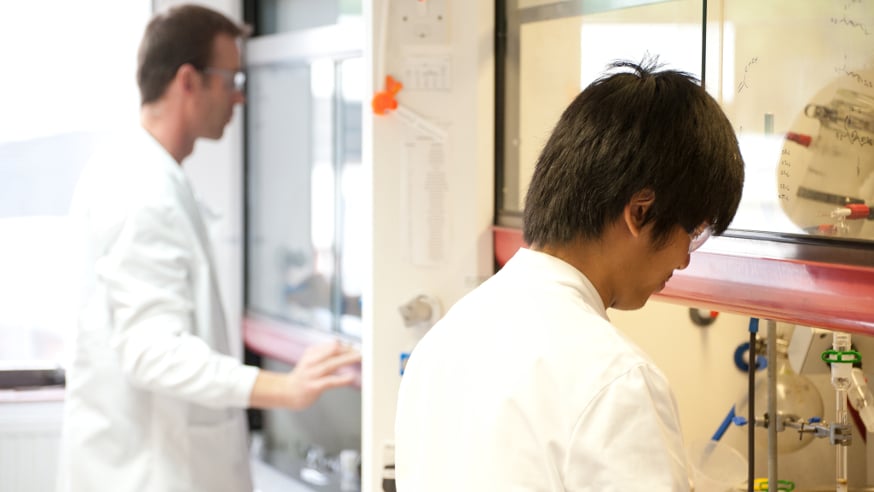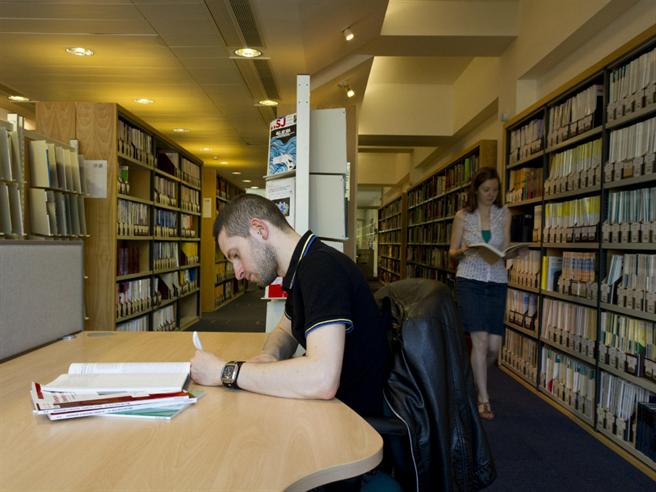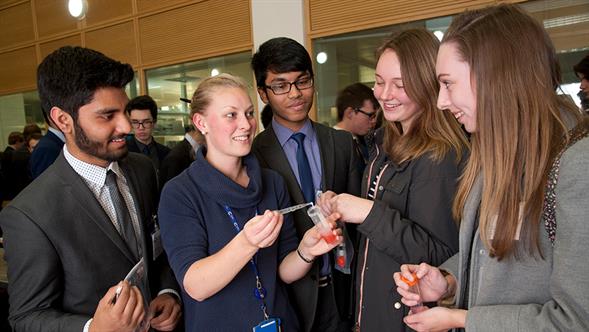
For Dr Ben O’Leary, studying for a Master’s degree in oncology here at The Institute of Cancer Research in London was a chance to delve deeper into the science of how we treat people with cancer.
“I studied for the MSc during the first three years of my specialist training as an oncologist,” he explains. “It provided me with an excellent introduction to scientific principles and cancer biology, and valuable opportunities to discuss and reflect on my clinical practice with colleagues with a range of skills and experience.”
More than 300 students like Ben have graduated from the ICR’s MSc in Oncology course since it launched in 2006. The ICR now also collaborates with Imperial College London to deliver an MSc in Genomic Medicine.
The ICR may be best known for its research, but our role as a world-leading higher education institution – a college of the University of London – is also vitally important.
A new learning and teaching strategy, Inspiring tomorrow’s leaders, sets out our ambitions to achieve this goal, focusing on a five-year period until 2021. It exists as part of the overall ICR strategy, alongside our research and operational strategies.
The goal of the learning and teaching strategy is simple: to educate and train the very best of the next generation of cancer researchers and clinicians. We’ve identified three ways to make this happen.
1. We’ll provide world-class research degree programmes
.tmb-0590x332.jpg?sfvrsn=229f6f69_9)
ICR Scientists in the Lab (Charles Milligan for the ICR)
Research degrees at the ICR are undertaken in a unique translational research environment. We’re looking to build on this by focusing on enhancing the experiences of our MPhil and PhD students. From helping students to build on research skills with face-to-face training and online material, to more training for new and experienced supervisors, there is a continual emphasis on improving what our research degrees offer.
The new, twice-yearly Introduction to Bioinformatics course is a case in point. Bioinformatics is increasingly important in modern cancer research, and following a periodic review of student training we identified an unmet need. So our training team worked with experts in the field to develop an introductory course for first-year PhD students.
Course founder Dr Bissan Al-Lazikani, Head of Data Science at the ICR, explains: “The aim is to expose participants to the basics of current bioinformatics techniques, and their uses and limitations in cancer research.
“All the trainers are ICR researchers who apply these bioinformatics methods in their own research. Using in-house experts ensures that the examples in the course are real and applicable, and connects the participants to our growing bioinformatics community which provides support and advice outside the course.”
Going forward, we will review alternative models for our research degree programmes and source additional studentship funding so that more students can study with us. We’ll also enhance support for those moving from PhDs to postdoc positions. There are also plans for building an ICR alumni community, among many other aims.
2. We’ll teach tomorrow’s leaders about the discoveries of today

As Ben’s experience showed, giving our future clinical leaders grounding in cancer science is vital to their work as oncologists.
Under the new strategy, we will provide students with basic cancer science information before they start and offer individual tutorial assistance where appropriate. A key priority flagged through our annual taught course student survey is to enhance the student experience of assessments, and in particular ensure feedback is provided in a timely fashion. We will continue to proactively seek feedback from students on their experiences of the courses. Providing more training for researchers and clinicians who teach is also an important focus.
Evaluating the success of our programmes will also be crucial. We want at least 100 students to register each year on postgraduate taught courses and at that least a 90% of our students exit our courses with a postgraduate qualification.
Meanwhile, we will consult on introducing other specialist courses where there may be a need, either for clinicians in training or to increase capacity for higher research degrees in specific areas of our research.
3. We’ll partner with peers and the public

Partnership is a key part of what the ICR does, both in its research but also its educational role. From the long-standing relationship with The Royal Marsden NHS Foundation Trust, to our status as a college of the University of London, these partnerships help support translational cancer research and deliver taught and research degrees. Our recently formed partnership with Imperial College London, forming the Cancer Research Centre of Excellence, provides the basis for further future collaboration between the ICR and Imperial.
Working with the public is also vital: for many years we have encouraged staff and student volunteering, public engagement and outreach so members of the public can learn about our research and interact with our scientists.
The ICR has many plans in the pipeline for how to build on these relationships, from creating e-learning resources to support collaborations and partnerships, to coordinating public outreach work and providing support and recognition for those who take part.
We have even more ideas to improve our learning and teaching than can fit into a blog post. For a start, there are the foundations that will underpin these three ‘pillars’ of work: providing the right environment and infrastructure, ensuring quality assurance is in place and focusing on equality and diversity in everything we do for students and supervisors.
The ICR’s teaching work also gained a boost when we were awarded institution-specific funding by the Higher Education Funding Council for England (HEFCE). The award of funding at an enhanced level from 2016-17 specifically recognised the ICR’s world-leading environment and the benefit its graduates provide to public life.
I recommend you read the strategy itself to get the full picture of our plans for the next five years in learning and teaching.
Ultimately, the aim of all this work is to inspire the cancer research leaders of tomorrow.
In Ben’s case, his experiences of studying at the ICR have now led to a PhD investigating circulating tumour DNA and CDK4/6 inhibition with our Molecular Oncology Team.
“When I’ve completed my research degree,” he says, “I hope to pursue a career path that combines research with clinical work so I can help to translate advances in the understanding of cancer and its treatment into clinical benefits for patients.”
comments powered by